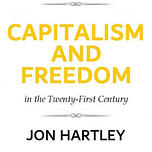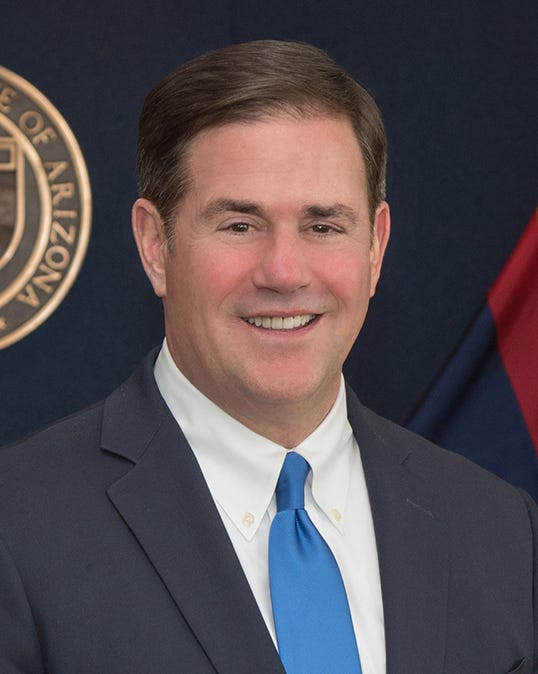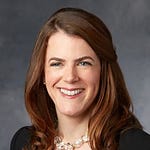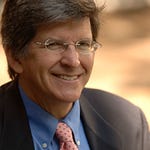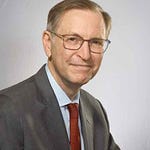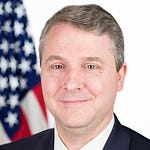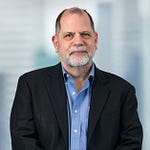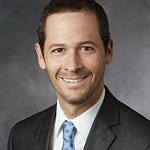Doug Ducey, 23rd Governor of Arizona, joins the podcast to discuss how he made Arizona the first state to pass Universal School Choice and Universal Licensing Recognition as well as his major influences and career which includes growing Coldstone Creamery into an international company as CEO.
Jon: “This is the Capitalism and Freedom in the 21st Century podcast, where we talk about economics, markets, and public policy. I’m Jon Hartley, your host. Today, I am joined by Doug Ducey, who served as 23rd Governor of Arizona from 2014 to 2022. While in office, Governor Ducey was extremely instrumental in the policy of the state of America with huge policy achievements, including spearheading and signing into law the first universal licensing recognition law in America and the first universal street course law in America. He also passed a climate impact rate of 2.5 percent, balanced the budget, reverted deficits and surpluses, and reduced the size of the government workforce. Before becoming Governor, he was CEO of Goldstone Creamery from 1995 to 2007 and helped grow the company into the massive international ice cream company we know it is today. Now, after leaving Governor's office, Governor Ducey now leads the CEO of Citizens for Free Enterprise. Welcome, Governor Ducey.”
Doug: “Thanks for having me, Jon. It's good to be with you. Happy New Year.”
Jon: “Happy New Year to you as well. So, talk a little bit more about your background. You were born in Toledo, Ohio, then moved to Arizona for college, where you gained your career and became a highly successful business person and eventually became the CEO of Goldstone Creamery. Were you always interested in politics? It seems like increasingly fewer highly successful business people today are winding up for office and many for obvious reasons in sort of how polarized things are right now. And maybe that sort of benefits the more career politician mold. And I'm curious, like, what in your early days might have enabled you to become both such a successful business person and such a successful governor?”
Doug: “Well, thank you. Thanks for that. Again, looking forward to the conversation. I wasn't so interested in politics as a young man or even as a businessman. I think I've always had an interest in being a good citizen. So, who I was voting for, especially for President, was important to me. But I was focused on my career and building my business and raising a family. As you mentioned, I grew up in Toledo, Ohio. My dad was a cop. My mom was a waitress and basically a stay-at-home mom. She worked part-time to help with my brother and sister. And I came to Arizona in 1982. I was in a different position. I had never been here. I didn't know anyone. My folks had split up. My mom moved out west. And I was in a position where I had to pay for my own schooling. So, I came out here. I studied business, made my way through college working for the local Anheuser-Busch franchisee, started my career in fracturing gamble, eventually built Cold Stone Creamery and sold that in 2007. And I'd never been to Washington, D.C. until I was 40 years old. And that's when I got some interest in public policy. After I sold the business, the role of governor is something I wanted to pursue. I really thought Arizona was a great state. And I didn't like the way we were being portrayed around the country. And I thought as governor you could be the chief spokesman.”
Jon: “Well, that's amazing. And Arizona has attracted so many people to the state over the decades. And I think most people who live in Arizona today are a big fraction. We're not boring Arizona. It's an amazing story in terms of Arizona's growth, which you've been an integral part of. I'm just curious, like, in terms of your philosophy of both economics or policy in general and governing, what has your sort of core philosophy been? And were there, you know, particular economic spots or economists that were influential to you along the way? I understand that Texas was sort of a model or a template for your policy agenda in Arizona, but certainly beyond Texas in many ways. I often hear you use the word policy entrepreneur. I'm curious, what does that mean to you?”
Doug: “So I developed my philosophy over time. I certainly didn't or wasn't born with a philosophy, although I think growing up in the Midwest, middle America, son of a police officer, it was conservative by nature. I did have good economics professors in school, and I also think going to Procter & Gamble was a great education on what drives profit or what was one of their smaller divisions, which I took on a leadership role in at one point. I also regularly read national reviews, so I think the idea of, you know, we should have Ago School or Milton Friedman, rather tight, tight economics, they made sense to me and something I believed in. I thought it was what built the nation's economy. You know, Adam Smith, playing the wealth of nations in 1776, the country being founded in 1776 to be overseen by a somewhat divine providence. So, I would say over the course of time, and then being a small business owner myself, Hope Stone Creamery grew into a large international brand, but it started as one single ice cream store in Tempe, Arizona. So, I was able to actually apply a lot of this philosophy to the building of that business, the incentives for the franchisees, the measurements of the headquarter office. I came to believe in that, and that's really when I ran for governor. I ran as a businessman. I ran as somebody who wanted to kick-start our economy, somebody that had built the business to now want it to shrink the government. I believed all that could be done. I think our eight years demonstrate that it can be done, and I think that those principles and values are applicable not only in the state of Arizona, but all 50 states, and certainly at the federal level.”
Jon: “Well, it's amazing what you've done in Arizona during both your terms across eight years. I want to get a little bit more into some of your big policy achievements, and I want to start with probably the facial licensing. How did you orchestrate Arizona becoming the first state in America to pass universal licensing recognition? I think a lot of people don't really understand licensing or appreciate the economic cost it imposes on licensed workers when they cross states, who often skew towards lower incomes. You have the idea that you have to get a recertify, you have to take more taxes, and so forth, for a very similar license after you leave the state. Not a lot of people, I think, are necessarily aware of that. For those who don't know, since you passed universal licensing recognition, about 12 or so states have followed your lead on this, both Republican and some Democratic states as well. I'm curious, how did you orchestrate universal licensing recognition, and how did you get interested?”
Doug: “You mentioned policy entrepreneur, and that's something that I said to my team, that I want to be somebody who leads and innovates on policy. But that was a few years into the governor's office. Since I did my diligence on running for governor, I noticed all the good things that Texas has done over the last 20 years. I really admire governors like Mitch Daniels in Indiana and what Jeff Bush has done on education in Florida. We very much took this like a boxer and gambler search and reapply initiative. We took those best practices and applied them to Arizona, and it took us a couple of terms to get that done. Then, moving forward, I said to my team, I want to be the one to lead on the innovations and on the things that can be breakthrough and make Arizona the top state in the nation in which to live, work, do business, get an education across the board. We basically brainstormed ideas on how to make the economy work better. Part of it was making it freer for people to pursue happiness or to pursue opportunities they wanted. The other thing was to get government and obstacles out of the way. In terms of universal licensing, we stood on the shoulders of a good idea, which was to give an opening to military spouses. I think everybody loves our folks in the military. They relocate every 18 months. Oftentimes, they trade a spouse as a license or certificate that is not applicable in the state in which they reside. We had the opportunity for military spouses to waive that. Once we saw that that worked, Americans do love and crave fairness. It was only fair that that was open to all individuals. I was somewhat shocked as to what a breakthrough idea it was because it seemed somewhat simple. We twinkled a little bit on my conservative reputation in saying if we were going to trust your government in your state, if you were somebody in good standing with a certificate or a license or a credential, we were going to recognize that as long as you were in good standing. I think that this is an idea, this universal recognition should be available in all 50 states. It was somewhat strange some of the opposition from my side, from the conservative side, still folks thought that it was unfair that an Arizonan moving to Illinois wouldn't enjoy the same benefit. I have to remind them that if you were in charge of the state of Arizona, Illinois would have to take care of themselves. Across the board, there's these ideas on how to lower taxes or reduce regulations or get obstacles out of the way. There's always an unintended consequence for every law that is passed. I imagine passed with good intentions, very rarely are they repealed. I wish we had sunsets on these laws. If something was a good idea and it's working well, you can pass it again. If it's a bad idea, it can expire. And then these tweaks or reforms, I think you can address it. That's basically how we looked at the portfolio of laws and regulations and ideas on what we could move forward over the next six years of behavior. The two terms we reported.”
Jon: “It's amazing. You mentioned Milton Friedman as an influence. It's funny. He wrote his doctoral dissertation in the early 20th century on occupational licensing. I think critical of doctors in certain professions that use occupational licensing as a gatekeeping kind of mechanism to keep their wages high and extract rent and so forth. It's amazing to hear that there was a lot of conservative opposition. Certainly, you think from certain professions that are a bit more in law, they're not necessarily thinking about what might be best for all of Arizona in terms of price and so forth. I want to jump into the next topic here, which I think is an amazing trend that's sweeping the nation, and I think probably the biggest policy shift in 2023 and in recent years, which is the topic of universal school choice. Just how do you orchestrate Arizona between the first state of America passing universal school choice? I'm amazed by the story of heard from me before the behind-the-scenes story of how it happened during COVID. It almost kind of happened or there was sort of a big battle in 2017. And for those who don't know, amongst our listeners, about a dozen states have similarly followed in passing some form of universal school choice, with about eight or nine states going in 2023 and many more expected to come in 2024 and years ahead. You're a policy trendsetter across states to say the least. I'm curious about the story behind going all in on universal school choice toward the end of your second term as governor.”
Doug: “First, a real honor to Milton Friedman, who not only preached freedom and free enterprise, one of the first laws to be passed in Arizona was the American Civics Act, so that every child that graduated high school had to pass the same civics exam that a newly nationalized American has to pass. If I would have had a third term, I would have passed the law. Every child in Arizona would have to watch the free YouTube series that is available for free on YouTube. And Milton Friedman talked about school choice, and I think this was in the 70s or early 80s, and it really animated my run for governor in 2014. I said I wanted to get taxes as close to zero as possible to our income taxes, and I wanted universal school choice. Arizona has been a leader on school choice. We've been a leader with charter schools, and we've seen great success with that. We were able to pass one of the first ESA bills in the nation in 2017, my second year. It was a very limited ESA program. That's Educational Savings Accounts. It's basically when somebody receives their taxpayer dollars, and they can apply them however they want, whether it's capital school, Christian school, Hebrew school, private school, homeschooling, or innovations. In the end result, it's in that anomaly of our Constitution that laws can be referred back to the voters with enough signatures. And that ESA law in 2017 was referred to the voters, and it was crushed by the voters. It was crushed 65 to 35. So, they were being very clear that they didn't want ESAs, and I said to my team, we need to do a better job communicating and persuading on this issue. And coming back to Milton Friedman, he also said that in a crisis, people look for the ideas that are lying around. And the crisis that we had in 1420 was hope, and parents were able to see what their children were or were not being taught. They were able to see a lack of rigor and much indoctrination around critical race theory and other things that had nothing to do with reading, writing, arithmetic, character formation, or American cynics. So, we took another run in the ESAs, and this time we went much larger. It's a universal educational savings account program. And one of the stories I love to tell about this is a woman that I met through the summer of 2020, the George Floyd Riots, was someone named Janelle Wood. And she was the leader of the Black Mothers' Corps, and Janelle wasn't very happy with me because I put out the National Guard and called an 8 p.m. curfew that summer. And she said a lot of her members and the other people in her organization were angry, and we agreed to disagree on how I was going to handle the unrest and mixer, and there wasn't rioting in Arizona. But we found an issue of common interest, and that was school choice. And Janelle Wood sat next to Angela Ducey, the first lady at my last state of the state, from the podium. I said that 50 years ago, politicians stood in the schoolhouse door and wouldn't let minorities in, and today, 50 years later, politicians stand in the schoolhouse door and won't let minorities out. These kids are trapped in failing public schools. It's time to set these families free. It was Janelle Wood who led the standing ovation, also helped organize all the African American pastors in Maricopa County to help lift these votes. Not one of them a registered Republican, and we were able to pass this. We only have a one-seat majority in our House and a one-seat majority in our Senate. Unfortunately, not one Democrat saw fit to vote for universal school choice, but it was led by a very diverse coalition. Today, it's the law of the land. They anticipate that there will be over 100,000 families participating in this program by this time next year. If you search this and you look at how the mainstream media is painting it, they're all pointing to the fact that there's more spending on it than was anticipated. How you can translate that is that it's wildly popular. More families want it than anyone could have ever anticipated. Public education is about educating the public. We are educating more people for less money in the school of their choice. Since we did this, nine other states have followed suit. Texas and Tennessee are on the one-yard line. I believe this is something that every parent in the nation should enjoy and be able to take advantage of. Not only do I believe it can reform K-12 education, I think that it can help renew our country because it brings communities together. They care about what their kids are learning and have high expectations for them. It's also a way to get more money into the classroom to better reward our teachers, which are critical in a good education in a classroom environment. So, so far, so good. There's no lost causes in American public policy because there are no gain causes. But just as we're doing this, the left is working very hard. The current governor in Arizona, who is a Democrat, has opposed this program. She pledged to terminate it in her first year, but she was unsuccessful. Now she's trying to eliminate it. So, it's very important that we not only get the law passed, but that we bring it to life and make it successful.”
Jon: “It's amazing how successful it's been and how much it has influenced other states. There's been eight or nine states going in 2023 after Arizona went in in 2020, and many more are expected to come this year, this coming year. Really, I think it's very fair to say that you've started a school choice revolution in terms of governance and actually getting it done. It's amazing. Those who have followed school choices, Milton Friedman idea, a themed almost like an abstract academic topic with limited programs across states. Bush passed in recent time in government, but the idea of having universal school choice for all children, it's almost unbelievable just how successful it's been over the past couple of years and how it's continuing. Again, I really think that's probably the most significant policy change that's happening across the United States. Strangely, I think we didn't get enough attention nationwide, even though it is a state issue. I predict in the coming years, almost half the states in America could very well have universal school choice thanks to your pioneering effort. I want to shift a little bit to fiscal policy and other accomplishments here. You passed a flat tax rate of 2.5 percent, balanced the budget, and we're in deficit surpluses and reduced the size of the government. I'm like, the federal government can't really borrow or spend money, so you have to cut spending if you want to cut tax. I'm sure that was not easy. I'm curious, that along with what other policy accomplishments you're most proud of as governor. I highly recommend that our listeners check out your website, reducingyears.com, which lays out all of your policy accomplishments. There's way too many to cover just in this interview. I'm curious, what other policy accomplishments were you particularly proud of, and what other ones were top wins in your mind?”
Doug: “Well, I think you're pointing out the real highlights, of course, universal school choice, the fact that we inherited a billion-dollar deficit and left billions of dollars in surplus when we were gone. We balanced that budget. We applied the same principles you apply in your own household or any small business does. We just spent less than we brought in, so it's really not that hard. It's more having the political will to make the difficult decisions, to tighten your belt, to take some of the heat from the media and the special interests down at the Capitol. But the other things that I beat a drum on would be, of course, the civics. I had no idea that we were going to be where we are today in terms of divided as a country as we stand in 2024. I came into office in 2014, and it seems rather than a decade ago, but it seems almost like 100 years. But I do think that our kids need to know more about our history and informed and patriotic and heroic history, and could include all the good and the bad and the ugly, because I believe as a nation we've always been in search of a more perfect future. Look at what's going on at our elite college campuses. These kids seem to know nothing of the true history of the United States or even the nation of Israel and how it was formed and the annual conflict that's been happening there for decades and centuries before that. That's all an indictment on K-12 and higher education. And if there was a silver lining in Tobin, it was universal school choice. If there's a silver lining in October 7th, may it be a reform of our higher education and the way that we inform our children in the knowledge of the United States and Western civilization. So, we can go on and on about other things, but I think, you know, if you're going to highlight, the other thing that I want to say to people, we need a secure border in there somehow. And we had a secure border in 2020 because we had a partner in the federal government. Border security is not immigration. Border security is public safety and national defense. And during the pandemic, it's also public health. So, the way you secure the border is you make sure that the border has enough resources. Walls work, surveillance works, enforcement of the law works along with conversation with Mexico. Mexico is Arizona's number one trading partner times four. My first visit international as governor was to Mexico City. My first visit international in a primary election was to Mexico City. And my last official visit as governor was to Mexico City. I had a wonderful relationship with the nation of Mexico while being as tough a talker on the border than any other governor in the United States. These are separate and mutually exclusive issues. So, you can have a great trade policy. You can have border security and stability in those communities. And then Washington, D.C., the halls of Congress, is where immigration reform happens, and that can be done as well. It shouldn't try to be done comprehensively. That's not going to work. That's a non-starter. That's, again, both parties playing for political advantage. Step one is to secure the board, get that done, and then go and let's have the debate around immigration. I'm leading an organization right now called Citizens for Free Enterprise. We promote and advocate for free enterprise. I talk with small business owners every day. Everybody needs to hire workers, and in the past, we've solved this through proper immigration programs. Most of these folks are Republican or right-leaning. There's no appetite for immigration reform with a wide-open, non-protective order. Secure that order, and then we can talk about improving immigration, whether you want to call it merit-based or immigration-based, if you need a reform. I've got a lot of ideas and passion around it, but step one is to secure the board.”
Jon: “That's fantastic. One last question here. Can you tell us a little bit more about Citizens for Free Enterprise, which you're the CEO of, and what its goals are and what it's doing?”
Doug: “Citizens for Free Enterprise is headquartered here in Arizona. It's an all-50-state organization. We're getting started here and in Georgia right now. We'll expand out over time. We're going to educate and advocate around free enterprise. I think it should scare everyone if you held up a sign that said capitalism and socialism in most college classrooms today be a 50-50 proposition. That changes a little bit when you frame it as free enterprise or free-market capitalism versus big-government socialism. But we want to make sure that we protect it. There's a lot of freedoms in the United States we enjoy—freedom of religion, freedom of speech, freedom of assembly. But it's economic freedom that underlies it all, that has built the strongest military machine in the history of the world. And it has also allowed us to get away with all these stupid spending decisions. It's because our economy is dynamic and we're prosperous as a people. We're also going to organize people around free enterprise. We're going to hold candidates accountable for free enterprise policies. These should not be partisan issues. These are all things that Citizens for Free Enterprise are going to do. You can check us out at CitizensForFreeEnterprise.com. And there will be more to follow beyond this. But please sign up for our emails. We're going to keep you informed. And this is a way—Thomas Sowell—you can break for Milton Friedman. But Thomas Sowell said you don't need to know much about brain surgery or botany if you're looking for office. But you should know something about economics because nearly every decision you make will affect the economy. And we want to make sure that people elected to office are making good economic and economic decisions.”
Jon: “I couldn't agree with you more, Governor. I really want to thank you so much for joining us today. It's been a real joy and honor for us to hear about your career and your thoughtful, very thoughtful approach to policy and revolutions that you've started in school choice, universal school choice, and universal licensing recognition across the country, and being a model governor for many governors across the nation. Thank you so much for joining us today.”
Doug: Thank you, Jon. Happy New Year.”
Jon: “Happy New Year. Today, our guest was Governor Doug Ducey, who served as 23rd Governor of Arizona from 2014 to 2022, was previously CEO of Cold Stone Creamery, and is now the CEO of Citizens for Free Enterprise. This is the Capitalism and Freedom in the 21st Century podcast, where we talk about economics, markets, and public policy. I'm Jon Hartley, your host. Thank you so much for joining us.”


